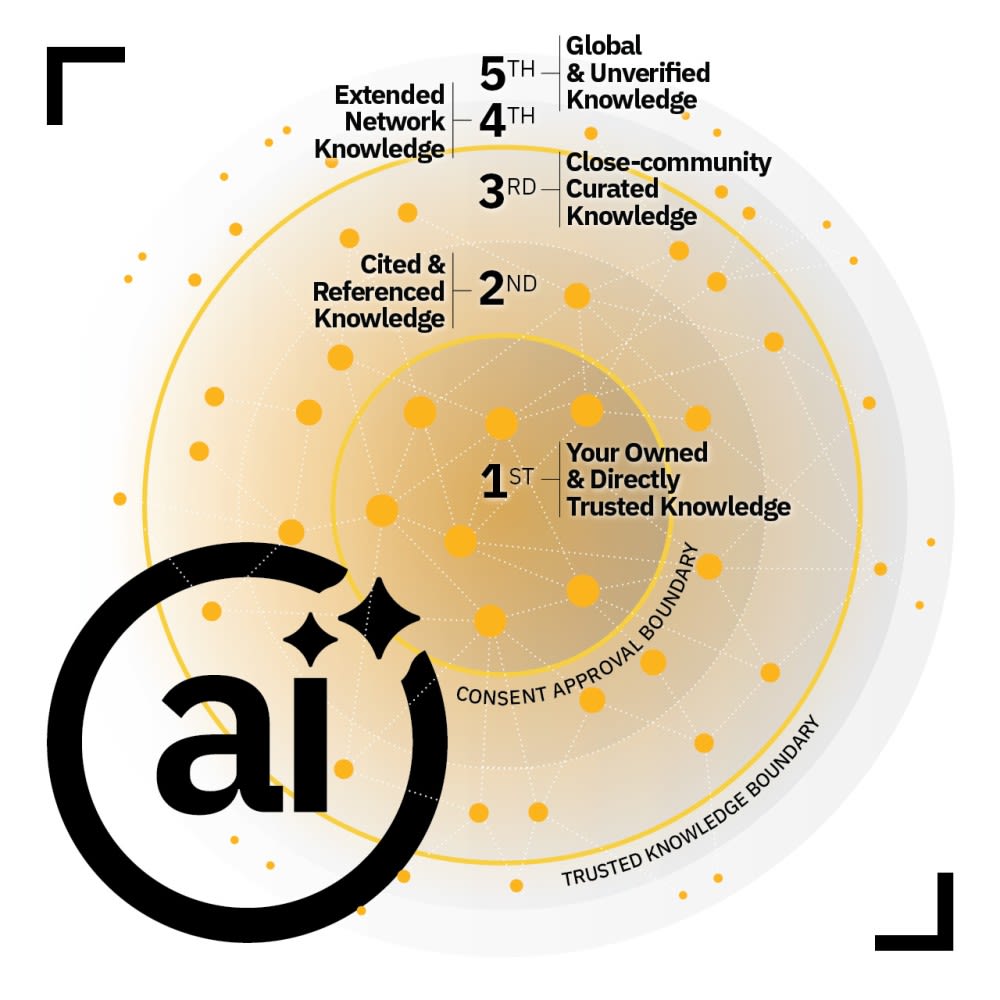This novel technology is particularly poor for strategic decision-making. A recent report for the legal industry noted that whilst up to 35% of legal firms say they are using AI, up to 82% of AI legal queries contain hallucinations.*
Or as Sam Altman noted: >“This is a generative technology, it is a creative helper, so please don’t rely on it for factual accuracy.”
- Sam Altman Oct 16, 2023The desire for a ‘trusted source’ of knowledge, augmented with an AI that replies accurately and with purpose, resonates very strongly with our customers and particularly their leadership. So we’ve built Degrees of Trust into our AI-enabled knowledge systems.
This simple yet powerful framework delivers some of the key business priorities our customers need when using Artificial Intelligence:
- An expert knowledge system for strategy and collaboration
- Removes hallucination, disinformation and cultural bias
- Builds in business compliance with Intellectual Property Rights
- Maintains confidentiality without giving information to the global training pool
- Responds in a variety of personalised formats and languages
- Matchmakes organisations and innovations
- Answers the question, “What don’t I know, and who should I speak to?”
The Degrees of Trust
This is a framework for the knowledge you use. Our Degrees of Trust AI is structured in a way that also addresses Intellectual Property use rights and confidentiality, per degree. The 1st Degree is the most trusted and the 5th Degree is the least trusted.
1st Degree: Your Owned and Directly Trusted Knowledge You can trust this corpus of knowledge because it’s your own, original information. You, authorised personnel, and partners who you have binding content agreements with, wrote, created and collated this information. It includes information on all the organisations and innovations within your network. For confidential information, the AI will only include it for those who have authorised access.
2nd Degree: Cited and Referenced Knowledge These are the citations and references that underpin the 1st Degree of Knowledge, including cited organisations that build a market map of innovations for AI. If your organisation has written a report, all the citations are part of your AI. You trust these references because they helped to build your opinion and understanding. The full texts of citations are excluded – unless licensing permits their inclusion.
3rd Degree: Close-community Curated Knowledge These are articles shared by accredited members within your network as a flow of content. The value of the information attaches to the credibility of the person referencing it, who is known and trusted. The full texts are excluded – unless licensing permits their inclusion in the AI.
4th Degree: Extended Network Knowledge This is material shared on social media by your extended network, such as on LinkedIn. It may contain reshared content from unknown connections. Trust is hard to quantify without prior review and there is the risk of fake, unvetted, or even regenerated content from ChatGPT and other LLMs. This knowledge is best used as data for charts, trends and sentiment analysis, extracting patterns rather than dealing with licensing issues.
5th Degree: Global and Unverified Knowledge This is the internet-wide pool of content from which AI can generate responses but without clear attribution or factual verification. It is best for research exploration, ideation, global sense-making, and creative productivity.
Legal Benefits of Using Degrees of Trust
There is a cluster of business risks and benefits in play here. For instance, certain EU laws require that platforms include options for users to exclude their material from the global LLM training pool. This is crucial for organisations to prevent their 1st Degree confidential information from being ingested into global AI models.
For 2nd, 3rd or 4th Degree knowledge you cannot knowingly ingest someone else’s content and remix their words via generative AI into your own opinion, without licensed approval. From a legal perspective that’s infringing copyright, and for AI’s that use Retrieval Augmented Generation (RAG) there is no get-out clause because you put it in there.
For the moment, 5th Degree knowledge is an open highway. ChatGPT and other established LLM service providers endeavour to de-risk their use by providing a level of indemnity protection. However, lawsuits are emerging in this area.
In line with these compliance and IP issues, the business problems we’ve aimed to solve with our AI include:
- Trusted Provenance
- Knowledge and Data Partnerships
- Mixing IP, Licensing, and Confidentiality
- Citations
De-silo Your Corpus of Knowledge
Networks are made up of the connections between people, organisations and the content they produce. Degrees of Trust provides a method for de-siloing the value of connected knowledge. The initial promise of LLMs plays out with the trust of proprietary and licensed knowledge plus the insight of global knowledge.
Interrogate your own body of knowledge and answer the question: What don't I know, and who should I speak to?
Contact Shapeable for more information.
References:
- Hallucination-Free? Assessing the Reliability of Leading AI Legal Research Tools. Varun Magesh et al. May 30, 2024.
- With thanks to Dinuka Piyadigama and Travis Hensgen on the Shapeable Team
- Further thanks for contributions to Sheridan Jobbins our Narrative Director, Gerard Doolin our Legal Director, and Adrian Shawcross our Creative Director.



